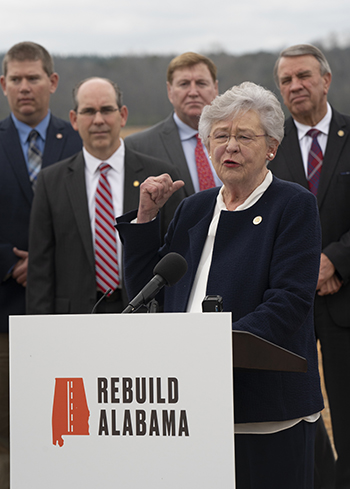House Approves Rebuild Alabama Plan

The Rebuild Alabama infrastructure plan and accompanying accountability measures passed the House of Representatives Friday. The primary bill, HB 2 by Rep. Bill Poole, R-Tuscaloosa, passed by a 83-20 vote. The package now heads to the Senate for consideration.
Gov. Kay Ivey called a special session of the Alabama Legislature Tuesday night following her State of the State address. The sole goal for the session is the infrastructure plan, which includes an additional 10-cent fuel tax over three years to fund improvements to state, county and city roads and bridges as well as improvements to the shipping channel at the Port of Mobile.
“We commend Gov. Ivey and legislative leadership for their courage and foresight to tackle some of Alabama’s biggest challenges,” said Alabama Farmers Federation President Jimmy Parnell. “The Federation supports increased and equitable funding for farm-to-market roads, and the governor’s plan addresses this need. Our members rely on roads and bridges to receive supplies; get their crops, livestock and poultry to market; and travel for work and school. Poor and inadequate infrastructure is one of the greatest barriers to rural Alabama enjoying the same economic growth as larger cities. We appreciate the governor putting forth a reasonable and accountable plan that will benefit all Alabama residents.”
HB 2 calls for an additional 6-cent-per-gallon tax on gas and on-road diesel beginning Aug. 31. An additional 2 cents per gallon would be levied Oct. 1 of 2020 and 2021, bringing the total increase to 10 cents per gallon. Beginning Oct. 1, 2023, the state fuel tax would be adjusted based on the National Highway Construction Cost Index, not to exceed a 1-cent increase every other year. The bill also calls for increased registration fees for electric and plug-in hybrid vehicles of $200 and $100, respectively. The Rebuild Alabama plan does not change exemptions for off-road diesel fuel.
A portion of the new fuel tax would be used to service a $150 million bond issue to secure federal funds to deepen the shipping channel at the Port of Mobile. Parnell said the investment could be a game changer for Alabama farmers and landowners.
“Agricultural and forestry exports already are an important part of the farm economy in Alabama,” he said. “Making Mobile a deep-water port would greatly enhance markets for Alabama-grown products like poultry and timber.”
HB 3 by Poole, which allows the state to borrow money for the port project, passed the House by a vote of 100-3.
Aside from Port of Mobile improvements, the additional tax revenue would be distributed through the Rebuild Alabama Fund with 66.67 percent going to the Alabama Department of Transportation (ALDOT), 25 percent to counties, and 8.33 percent to municipalities. In addition, ALDOT would provide $400,000 to each county in exchange for a federal allocation which previously was reduced due to administrative costs.
Federation Director of External Affairs Matthew Durdin said the plan addresses members concerns’ about the lack of funding for county roads.
“This distribution method will greatly increase the amount of money available to counties for rural roads and bridges while strengthening accountability for funds going to ALDOT,” Durdin said. “Most importantly, the legislation ensures every penny of new tax revenue goes to actual infrastructure improvements, not overhead costs.”
HB 2 prohibits the increased tax dollars from being spent on salaries and benefits of employees, or equipment, buildings and contractors unless directly related to an infrastructure project. Additionally, SB 2 by Sen. Clyde Chambliss, R-Prattville, strengthens the Permanent Joint Transportation Committee and gives it additional oversight for ALDOT projects. The companion bill, HB 1 by Poole, passed the House by a vote of 103-0.
Of the 25 percent in new tax revenue allocated to counties, 45 percent would be divided equally among the 67 counties, and 55 percent would be disbursed based on population. For cities, 25 percent of their 8.33 percent would be divided equally with 75 percent distributed based on population.
ALDOT would be required to annually report project expenses and results to the Permanent Joint Transportation Committee. ALDOT also would create a $10 million annual grant program through which counties and cities could apply for additional funds. Beginning with fiscal year 2020, another $30-50 million would be available for local projects through the Alabama Transportation Rehabilitation and Improvement Program-II (ATRIP-II). Oversight would be provided by an appointed committee.
